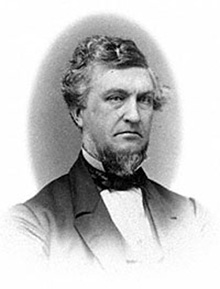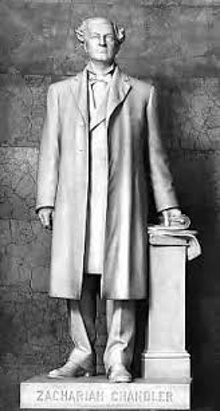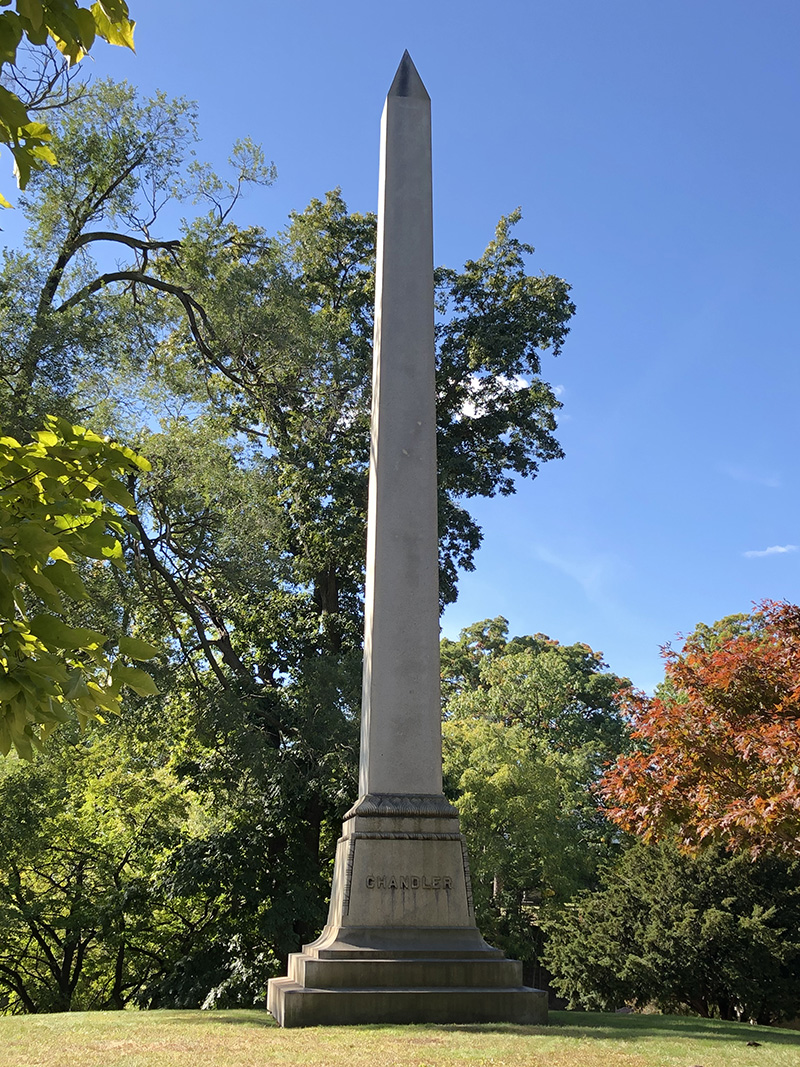 Click here to view or download a PDF.
Click here to view or download a PDF.
 Zachariah Chandler was born in Bedford, New Hampshire on December 10, 1813. Chandler moved to Detroit in 1833 and opened a dry goods business general store. Later he became a banker and went into land speculation, amassing wealth.
Zachariah Chandler was born in Bedford, New Hampshire on December 10, 1813. Chandler moved to Detroit in 1833 and opened a dry goods business general store. Later he became a banker and went into land speculation, amassing wealth.
In 1851, Chandler defeated John R. Williams (also buried in Elmwood) and became the Mayor of Detroit. In 1852, he was the Whig Party candidate for Governor of Michigan but lost the race to incumbent Robert McClelland.
With the collapse of the Whig Party, Chandler became one of the founders of the Republican Party when it was created in 1854. He was instrumental in organizing the historic meeting at Jackson, Michigan where the Republican Party was organized. Chandler served as a delegate to the Republican National Convention in 1856 and was a member of the party’s national committee.
Chandler identified most with the Radical Republicans who opposed the Fugitive Slave Act of 1850. Chandler supported the abolition of slavery. He contributed and helped raise money to support Michigan abolitionists. During the Civil War, he was instrumental in African Americans joining the Union Army. Chandler later advocated for civil rights for newly freed slaves.
In 1857, Chandler replaced Lewis Cass (also buried in Elmwood) as a U.S. Senator. Once in office, he supported and promoted Radical Republican issues. He attacked the Supreme Court’s Dred Scott decision, which upheld the fugitive slave laws, and opposed the admission of Kansas to the Union under the Lecompton Constitution, which allowed slavery. He urged President Lincoln to prosecute the Civil War more forcefully; he vigorously advocated emancipation of slaves; and he later backed the Reconstruction Acts. Chandler served as a member of the Joint Committee on the Conduct of the War and a leading supporter of a new national bank.
Zachariah Chandler served as Senator until 1875, when the Democratic candidate defeated him. That same year, President Ulysses S. Grant appointed Chandler as his Secretary of the Interior, a position he held until 1877. During this time, he reorganized the department.
After being elected to the U.S. Senate in 1879, Chandler was being considered as the Republican candidate for U.S. president in the 1880 election. However, following a speech in Chicago, Chandler died in his hotel room on November 1, 1879. He is buried in Section B, Lot 49. Chandler’s obelisk monument, the tallest at Elmwood Cemetery, is pictured below. The obelisk is used in memorial art to indicate a person who has accomplished his life’s work.
As an aside, here in Detroit, Chandler Park, Chandler Golf Course and Chandler Drive are all named for this esteemed citizen.
Chandler is listed in Elmwood’s Underground Railroad Network to Freedom Self-Guided Tour Map.
This statue of Zachariah Chandler was in the National Statuary Hall. It was returned to Michigan after the state legislature voted in 2007 to replace it with a statue of President Gerald Ford. The Chandler statue now rests in the atrium of Constitution Hall in Lansing, Michigan.


This material is based upon work assisted by a grant from the Association for the Study of African American Life and History (ASALH), funded by the Department of the Interior, National Park Service. Any opinions, findings, and conclusions or recommendations expressed in the material are those of the author(s) and do not necessarily reflect the views of ASALH or the Department of the Interior. Elmwood Cemetery’s Network to Freedom Application was completed by Carol Mull and Gabrielle Lucci. This biography was completed based upon the Application and records available through Elmwood Cemetery, Detroit Historical Society, Burton Historical Library, Military Records of the United States, Michigan Historical Center, and various information sources.
